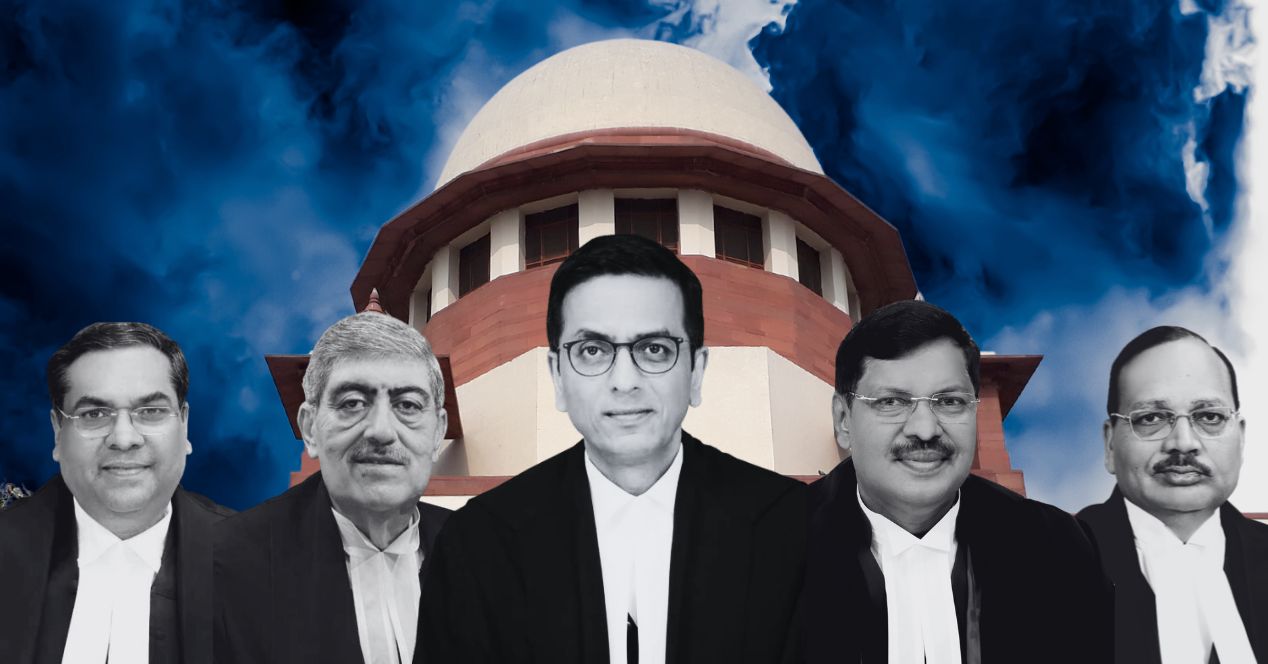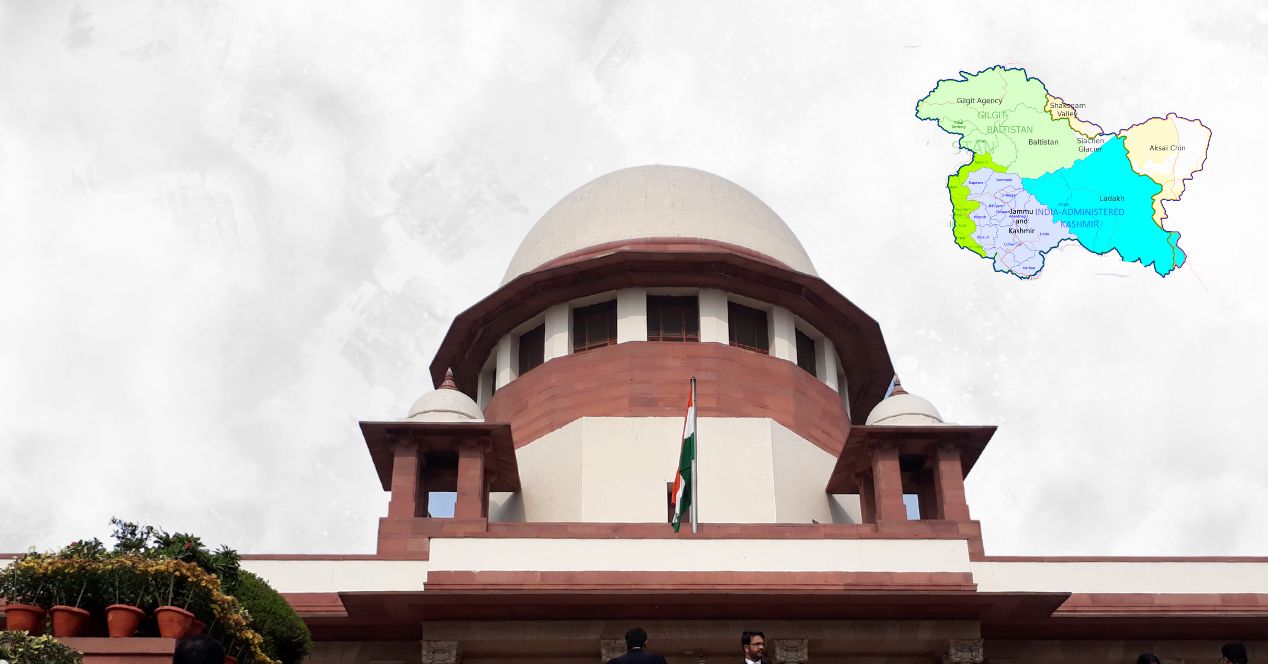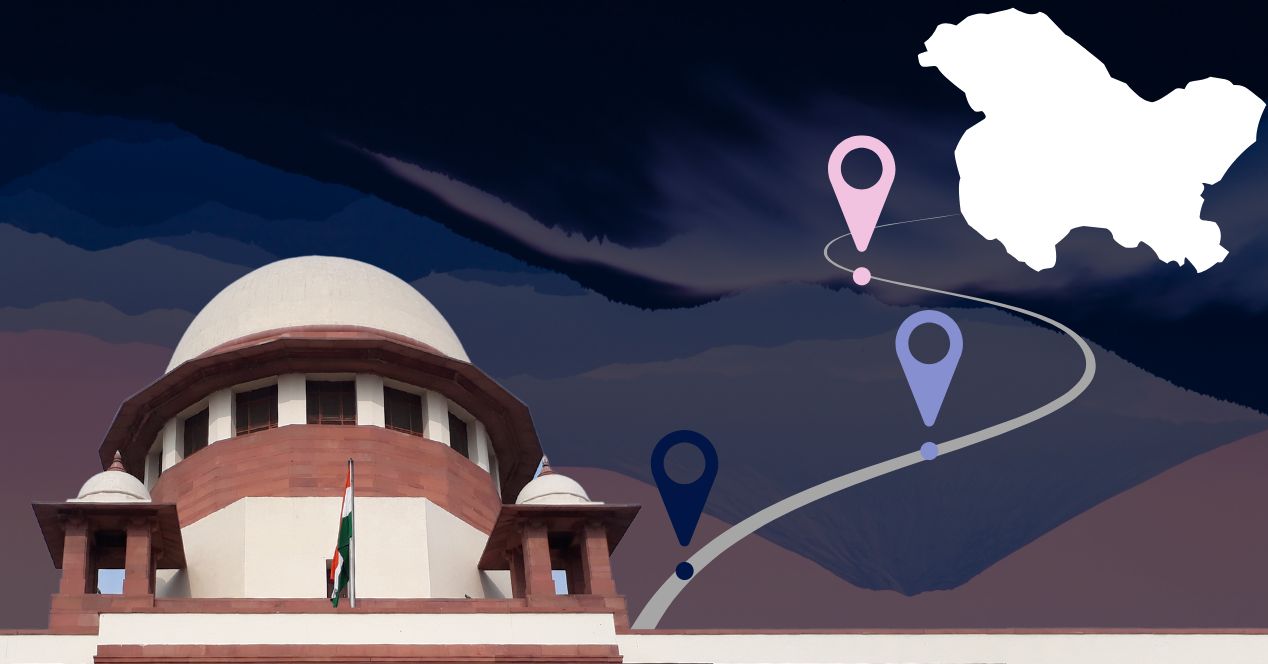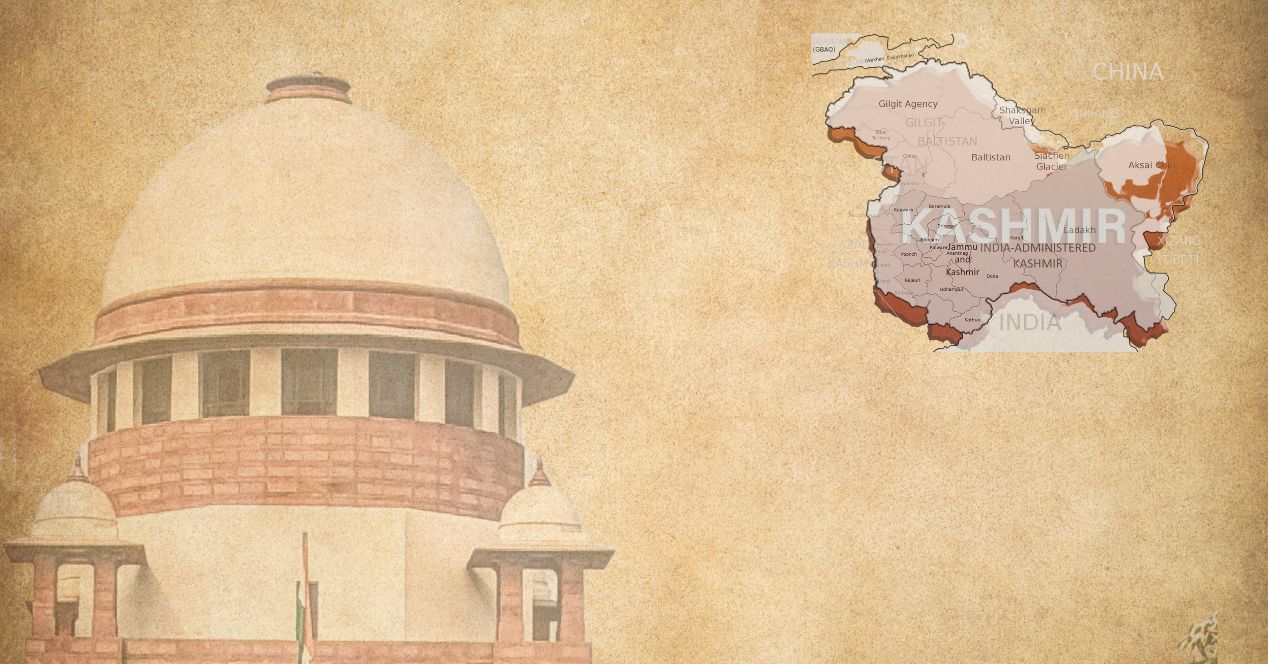Abrogation of Article 370 | Day 4: J&K Constituent Assembly made Art. 370 Permanent in the State’s Constitution
Challenge to the Abrogation of Article 370Judges: D.Y. Chandrachud CJI, S.K. Kaul J, Sanjiv Khanna CJI, B.R. Gavai J, Surya Kant J
Senior Advocate Gopal Subramanium appearing for Muzzafar Iqbal Khan argued for a majority of the day, relying on the Constitution of Jammu and Kashmir (J&K). Senior Advocate Zafar Shah followed and will continue arguments tomorrow.
In the previous hearings, Sr. Adv. Kapil Sibal argued that Article 370 is a permanent feature of the Constitution, and that Parliament cannot assume the role of J&K’s Constituent Assembly.
Subramanium’s key point today was that the Constituent Assembly of J&K “was not silent on the fate of Article 370”. He argued that they had expressed their intent for Article 370 to be permanent through the very document they were constituted to make—the Constitution of Jammu and Kashmir. The provisions of the Constitution of India, he said, were not applied to J&K only through a Presidential Order. Instead, “they were embraced by the J&K Constitution.”
Background
Article 370 of the Constitution of India provided the State of Jammu and Kashmir with a special constitutional status. The provision substantially limited Parliament’s power to legislate for the State compared to other states.
On August 5, 2019, the Union government diluted Article 370, revoking Jammu and Kashmir’s special status. First, President Ram Nath Kovind issued presidential order CO 272. This Order allowed the Union to amend Article 370 without the recommendation of the Constituent Assembly.
Since J&K was under President’s Rule at the time, the powers of the Jammu and Kashmir Legislative Assembly were vested in the Union Parliament. So, a few hours after CO 272 was issued, the Rajya Sabha recommended the abrogation of Article 370 through a Statutory Resolution under Article 370(3).
On August 6, 2019, President Kovind issued a Proclamation, CO 273, putting the Rajya Sabha’s recommendation into effect. All clauses of Article 370 ceased to operate, except Clause 1 which was amended to state that the Constitution of India applies wholly to the State, removing the special status awarded to Jammu and Kashmir.
On August 9, Parliament passed the Jammu and Kashmir Reorganisation Act, 2019. This Act bifurcated the State of Jammu and Kashmir into two Union Territories—J&K and Ladakh.
Petitions were filed challenging the constitutionality of the dilution of Article 370 and the bifurcation of the State into two Union Territories.
On August 28, 2019, a 3-Judge Bench led by former CJI Rajan Gogoi referred the case to a 5-Judge Constitution Bench.
On October 1, 2019, 5-Judge Constitution Bench of the Court comprising Justice N.V. Ramana, S.K. Kaul, R. Subhash Reddy, B.R. Gavai and Surya Kant decided to hear the case from November 14th, 2013. The petitioners sought the case to be placed before a larger Bench. On March 2nd, 2020, the Bench refused to refer it to a larger Bench.
On July 3, 2023, the Supreme Court listed the matter to a Constitution Bench led by Chief Justice D.Y. Chandrachud. The Bench assembled on July 11, 2023 and decided to hear the challenge from August 2, 2023.
The Constitutions of Jammu and Kashmir Shows the Constituent Assembly’s Intent to Retain Art.370
To prove this, Subramanium referred to the Preamble of the J&K Constitution, which states that it is a document to “further define the existing relationship of the State with the Union of India as an integral part thereof”. Article 3 states that “the State of Jammu and Kashmir is and shall be an integral part of the Union of India.” This shows that the Constitution of India was made applicable to J&K, with exceptions and modifications, by the Constituent Assembly of J&K itself. It was never the prerogative of the President of India to make that imposition.
Further, Article 5 of the J&K Constitution tied itself to Article 370, by stating that “The executive and legislative power of the State extends to all matters except those with respect to which Parliament has the power to make laws for the State under the provisions of the Constitution of India.” Subramanium argued that this provision showed the Constituent Assembly’s intent to keep Art. 370 alive.
Article 147, which dealt with the Amendment of the J&K Constitution states that “no Bill or amendment seeking to make any change in (a) this section; or (b) the provisions of sections 3 and 5 ; or (c) the provisions of the Constitution of India as applicable, in relation to the State, shall be introduced or moved in either House of the Legislature.” These
These and other provisions of the J&K Constitution are similar to the provisions of the 1954 Presidential Order which gave effect to Article 370. Relying on the connection, Subramanium argued that the J&K Constitution was deeply intertwined with the Constitution of India. The fact that the J&K Constitution did not abrogate or allow the Legislative Assembly to abrogate Art. 370 was the will of the members of the Constituent Assembly put in action. Subramanium said that the Union of India had accepted this structure and therefore could never abrogate the provision. The Union especially could not undertake such abrogation unilaterally.
Abrogation Cannot Be Unilateral
Subramanium asserted that Article 370 of the Constitution recognised a bilateral relationship between India and J&K. India could make laws for J&K only with the consultation or concurrence of its Government. The two entities—the President of India and the Legislative Assembly of J&K—together would make laws for the State. Therefore, any change to Article 370 could not be a unilateral exercise without J&K’s concurrence. It has to be a ‘bilateral’ exercise with dialogue and deliberation.
In direct violation of this mechanism of the Constitution, C.O. 272 was a unilateral decision that the Union undertook without J&K’s concurrence. Subramanium argued that this was impermissible.
Justice Khanna questioned this line of reasoning. He stated that Article 370 was a ‘flexible’ provision. Constitutions are made once, to be applied for a long period of time, which meant that its provisions were designed to be subject to change. Article 370 as well, Justice Khanna suggested, could be modified from time to time to assimilate J&K with the rest of the country. Subramanium agreed but clarified that this flexibility was subject to ‘bilateralism’. In other words, without proper dialogue with J&K, India could not unilaterally modify or abrogate Article 370.
Should the Indian Constitution be Amended to Allow the J&K Constitution’s Provisions to Apply?
In the second half of the day, the Chief Justice noted that while the Indian Constitution talks about the J&K Constituent Assembly, it did not mention the J&K Constitution at all! After the Constituent Assembly of J&K dissolved in 1957, neither J&K nor India thought to amend the Indian Constitution to bring the J&K Constitution into the fold. The J&K Constitution imposed limitations on the Executive power of the Union and the Parliament in the State. He asked Subramanium if it was necessary to include these parts of the J&K Constitution into the Indian Constitution, to make it an intrinsic part of the Indian framework. Without the Constitution of India also imposing a limitation on Parliament and the President from modifying the parts of the Constitution that J&K has carved out for itself, what stops the Union from making such modifications, he asked.
Subramanium replied that the J&K Constitution was in itself a product envisaged by the J&K Constituent Assembly, a body duly recognised by the Indian constitution for this sole purpose.
C.O. 272 Contravenes the Purpose of Article 370
Focusing on C.O. 272, (the first of two Presidential Orders that abrogated Article 370) Subramanium submitted that the Order was ultra vires or unconstitutional. He elaborated that the purpose of Article 370 was to give a voice to the will of the People of J&K and establish a bilateral relationship between the State and India. In this sense, Article 370 recognised an ‘asymmetric’ form of federalism which recognises special conditions and needs of people in certain places and grants them special rights. This system of federalism was crucial and could not be abrogated.
C.O. 272, Subramanium submitted, undermined the asymmetry enshrined in Article 370. It changed the meaning of J&K’s ‘Constituent Assembly’ to mean ‘Legislative Assembly’ without the consent of J&K’s government. It was a unilateral decision of the Union of India which breached the principle of bilateralism incorporated under Article 370. This consent of J&K’s elected government, and by extension the people of Kashmir was ignored. This rendered C.O. 272 unconstitutional.
An Interpretation Clause Cannot be Used to Change the Meaning of a ‘Constituent Assembly
Further giving reasons for why C.O. 272 was ‘defective’, Subramanium stated that this Presidential Order wrongly used an interpretation clause of Article 367. He argued that Art. 367 was designed to ‘aid the interpretation and construction of the Constitution’. Clause (d) of C.O. 272 says that ‘Constituent Assembly’ in Article 367 would henceforth be read as ‘Legislative Assembly of the State’. An incredulous Subramanium argued that the two bodies are distinct by nature, and cannot be forced to mean one by simply interpreting it to be so.
Subramanium insisted that by using a Presidential Order, an executive tool, to change the meaning of ‘Constituent Assembly’ under 367, the Union had effectively and wrongly amended Article 370(3).
President’s Rule Cannot be Used to Act Against the Purpose of Article 370
CJI D.Y. Chandrachud noted that C.O. 272 was introduced under Article 370(1)(d), which meant that the State government had to be consulted by the President before passing any Order. To test the validity of C.O. 272, the CJI pointed out, the main question was who the valid ‘state government’ was at the time when the C.O. 272 was passed. Note that when C.O. 272 was passed, J&K was under President’s Rule, and the Parliament had assumed the power of the State Government.
Subramanium asserted that the expression ‘state government’ by the nature of Article 370 meant a democratically elected government accountable to an Assembly. He argued that the President and the state government are distinct bodies, and cannot be merged under Article 370. Taken aback, CJI Chandrachud asked, “are you for a moment suggesting that when a proclamation under Article 356 is in operation, there is a fetter on the exercise of the power under the second proviso to Art.370(1)(d)?”. In other words, the Chief asked whether Article 370 imposed limitations even when a State was under Presidential Rule? Subramanium said yes, and that it was strongly expressed in the architecture of Article 370.
He explained that Article 370 was a manifestation of the Constitutional principle of federalism. Hence, it was necessary that both parts of that federal structure—the state government and the president—must be available to enable an exercise of the powers under Article 370.
Further, the power under Article 356 was created for the purpose of tackling emergencies. This is alien to the purpose of Article 370 which is to ensure that the Constituent Assembly’s views are taken into account. The purpose of Article 356 is not to be a “reservoir of power” to exercise powers under the Constitution that “have nothing to do with emergency” situations. Article 370, Subramanium argued, imposed a limitation on the unfettered exercise of President’s Rule in J&K.
Sr. Adv Zafar Shah: J&K’s Accession to India was Different from Other States
Shah addressed the Bench for about 20 minutes before the day’s hearings concluded. He argued that Maharaja Hari Singh acceded J&K to India under ‘extraordinary circumstances’, though he intended to remain an independent State. This is why he ‘shook hands but never embraced’ India i.e. he acceded to J&K to India but never merged the State with India entirely.
The accession of other States to India, Shah argued, was different. They merged with the Union of India completely and thereby lost their individual personalities. This was in stark contrast to J&K which retained its sovereignty in all aspects except three—communications, defence and foreign affairs.
Shah will resume his arguments tomorrow August 10, 2023.





